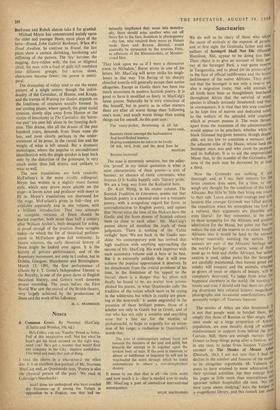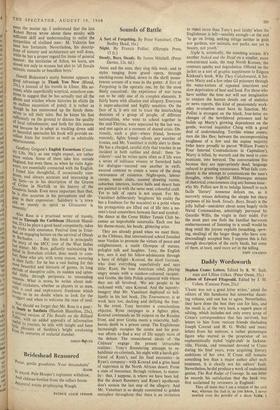Sanctuaries
WE do well to be chary of those who adopt the cause of animals at the expense of people, and at first sight the Grzimeks father and son, authors of Serengeti Shall Not Die (Hamish Hamilton, 30s), appear to be doing just that.
Theirobject is to give an account of their sur- vey of the Serengeti Park, a vast game reserve in Tanganyika, and to plead for its preservation in the face of official indifference and the brutal fecklessness of the native Africans. They point out that the Serengeti is not only a reserve but also a migration route; that wild animals of all kinds have been so thoughtlessly butchered throughout Africa that the survival of manj species is already seriously threatened; and that, in consequence, it is vital that this area continue to be kept free of natives and dedicated solelY to the welfare of the splendid wild creatures which at present possess it. The main threats, apart from the meanness of the administration, would appear to be poachers, whether white of black (licensed big-game hunters, though despie- able, are too few to constitute a menace), and the adjacent tribe of the Masai, whose land the Serengeti once was and who covet its pastures and its buffaloes. It is to aid the impoverished Masai that, to the scandal of the Grzimeks, the area of the park may be decreased by at least a third.
Now the Grzimeks are nothing if not thorough; and, ds I say, their concern for the brute creation does seem, for a time, to out- weigh any thought for the condition of the local Africans. But little by little they bring one round to their side. Leave alone their courage and self. lessness (the younger Grzimek was killed during the expedition when his monoplane ran foul of a vulture), their arguments are plausible and even liberal: for they remember, in the end, to show sympathy for the Africans and positive admiration for the Masai, but point out that to reduce the size of the reserve or to admit hungry Africans into it would be fatal to the animals without materially assisting the natives. The animals are part of the Africans' heritage and the world's heritage: of course, some of them must go to feed and clothe Africans, but unless caution is used, unless parks like the Serengeti, are carefully maintained, then human greed and cruelty will conquer and the animals, whethd as givers of meat or objects of beauty, will be completely destroyed. To judge from what lins happened elsewhere in the world, the warning i5 timely and true. I should add that there are ple3s' ing diversions into colonial history, magnificent photographs and occasional manifestations, irrr deemably vulgar, of Teutonic humour.
The monks of Athos are also threatened. It is not that people want to butcher them, but simply that those of Russian or Slav origin, WI once made up a large proportion of Athoq' population, are now steadily dying off without reinforcement or support from behind the Um' Curtain. Still, there are enough recruits front, Greece to keep things going after a fashion: in any case, to judge from Jacques Valentin account in The Monks of Mount AO.' (Deutsch. 18s.), I am not sure that I find th` decline in the number and finances of the to be altogether regrettable. M. Valentin a r" pears to have attained to some admiration their spiritual activities; but they emerge frollA his pages as little more than superstitious anue ignorant (albeit hospitable) old men. 'No nrif here cares about studying,' says the keeper °I a magnificent library, and this remark just ab°13 eUfficient skill and understanding to enlist the sYnopathies of civilised men : M. Valentin has been less fortunate. Nevertheless, his descrip- tions of scenery and architecture are well done, While he has a proper regard for items of general interest: the territories of Athos, we learn, are Closed not only to women-but also to 'all female animals, eunuchs or beardless boys.'
Oswell Blakeston's scatty humour appears to good advantage in Thank You Now (Blond, 25s.), a journal of his travels in Ulster. His ac- count, while superficially sceptical, somehow con- trives to suggest that he has actually 'met all the Ituosts and witches whose histories he elicits (in rut endless succession of pubs); it is rather as though he has summoned up the fiends them- selves to tell their tales. But he keeps his feet sufficiently on the ground to discuss the quality Of local refreshments; and both for this reason end because he is adept at tracking down odd or beautiful spectacles his book will provide ex- cellent hints for tourists as well as admirable entertainment.
Geoffrey Grigson's English Excursions (Coun- teY Life, 30s.), as one might expect, are rather More sedate. Some of them take him outside 4gland, but even these, as when he visits Agin- court, are essentially connected with the English. found him thoughtful, if occasionally cum- °tolls, and always accurate and interesting in his facts—as in his description of the Graves of Grimr in Norfolk or his history of the Goodwin Sands. Even more important than that, 4° is also accurate in his perceptions and ele- gnt in their expression : Salisbury is 'a town Still as seemly in spirit as Gloucester is unseemly,' Alan Ross is a practised writer of travels; land in Through the Caribbean (Hamish 21s.) he plays a good hand competently, takes his tricks with assurance. Festival time in Trial- an engaging lecture on the survival of Obeah Etarbados. . . . But this book is principally the story of the MCC tour of the West Indies last winter. Mr. Ross, gallantly maintaining his bf elief in first-class cricket, does much to corn- fort those who are, with some reason, wavering In their faith: for he has a real feeling for this ittr'st beautiful and intricate of games, its long Periods of deceptive calm, its sudden and splen- did shifts through peripateia to resounding uemesis. What is more, he writes about indi- vidual cricketers, whether as players or as men, With a cool and exploratory frankness which leaves °yes us in no doubt where to look for the "raggart and when to welcome the man of steel.
i‘lur should we forget that Mr. Ross is a poet: in South to Sardinia (Hamish Hamilton, 21s.), a 7, revised version of The Bandit on the Billiard „Qble, with an added appendix of information ii.seeful to tourists, he tells with insight and keen ic pleasure of Sardinia's bright awakening IrOnl itS centuries of malarial slumber. sums the matter up. I understand that the late Robert Byron wrote about these monks with SIMON dIVEN



































 Previous page
Previous page